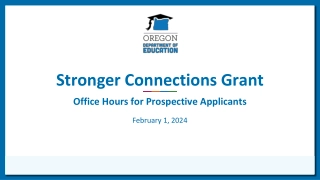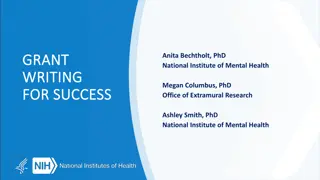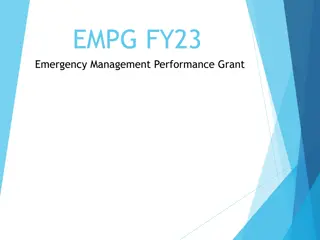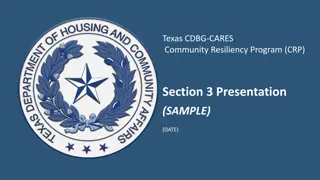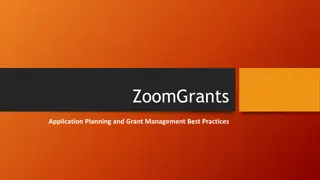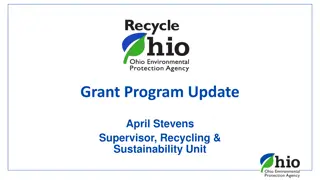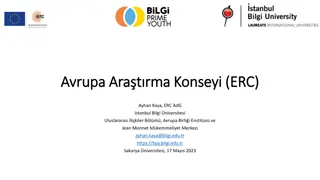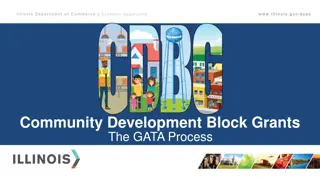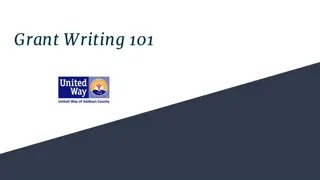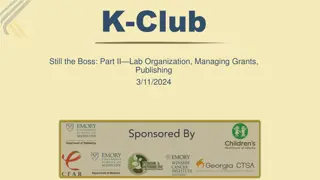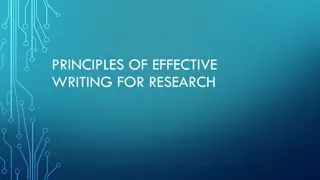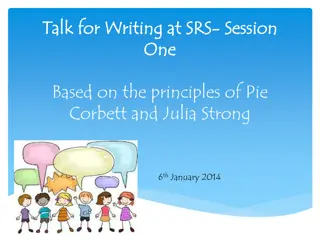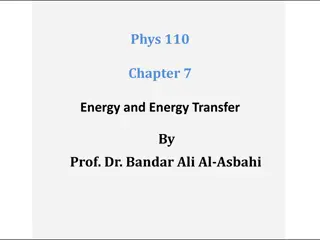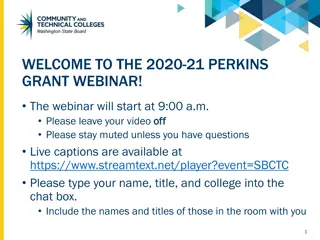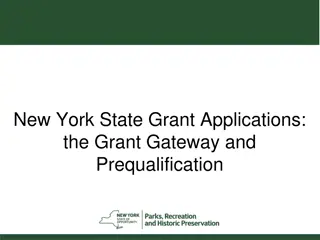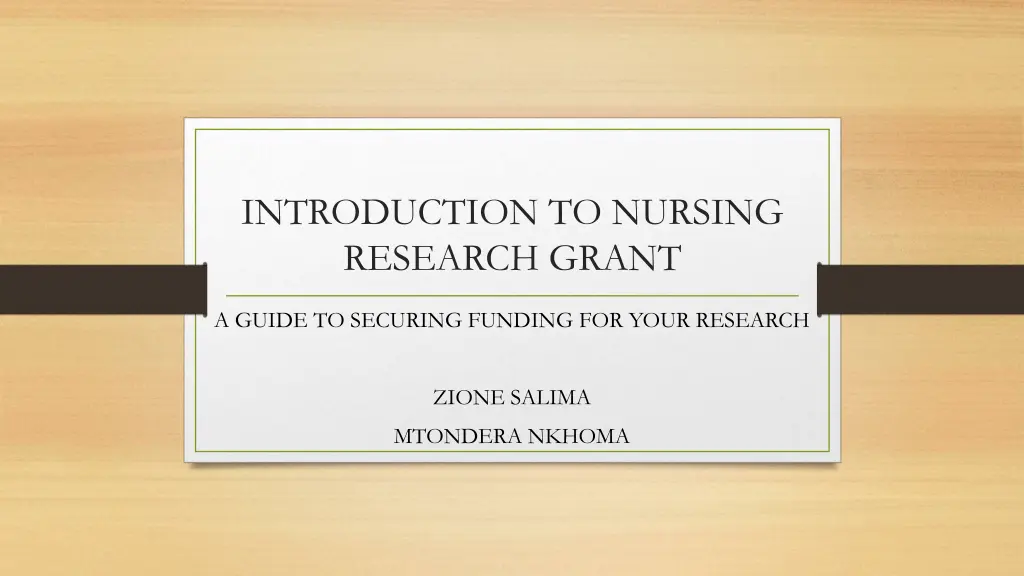
Securing Nursing Research Funding: A Comprehensive Guide
"Learn how to secure funding for your nursing research through this detailed guide. Understand key components of a research grant proposal, common mistakes to avoid, and essential considerations for successful grant writing. Equip yourself with the knowledge to present a compelling case for financial support and enhance your research opportunities."
Download Presentation

Please find below an Image/Link to download the presentation.
The content on the website is provided AS IS for your information and personal use only. It may not be sold, licensed, or shared on other websites without obtaining consent from the author. If you encounter any issues during the download, it is possible that the publisher has removed the file from their server.
You are allowed to download the files provided on this website for personal or commercial use, subject to the condition that they are used lawfully. All files are the property of their respective owners.
The content on the website is provided AS IS for your information and personal use only. It may not be sold, licensed, or shared on other websites without obtaining consent from the author.
E N D
Presentation Transcript
INTRODUCTION TO NURSING RESEARCH GRANT A GUIDE TO SECURING FUNDING FOR YOUR RESEARCH ZIONE SALIMA MTONDERA NKHOMA
Outline Introduction Key components/ outline for Research Grant proposal Key issues to consider Common mistakes in grant research proposal writing
Introduction Grant Proposal is a written document that outlines a request for funding from a grant-making organization Types of Research Grants: Government (e.g., NIH, NSF) Private Foundations (e.g., Gates Foundation) Institutional Grants
Purpose of Research Grants The purpose of a research grant proposal is to present a compelling case for why an individual, organization, or project deserves financial support. for research, resources, equipment, etc. Explicit intent is to win funding for your research that could enhance a specific program area at your facility/ district/ health sector/ academia/ organization/industry through new evidence to inform new opportunities
Self assessment- before starting ?Value and impact on individuals, practice, community, health sector, society ?Qualification, training, suitability and capacity of the investigator
Self assessment- before starting ?Organizational history of successful research ?Do you understand the priorities of the funder? ? Do you fit
Self assessment- before starting Originality and novelty of the idea- ?not researched before Are the methods proposed appropriate? What are the limitations?
Grant proposal structure/ outline 150-200 words Summary of the proposal Budget & Timelines Executive summary/ Abstract Why must you be funded Impact Relationship with other work/ current efforts in the field- interlink Brief background of existing knowledge, An analysis, not necessarily a descriptive list, of scientific materials about a specific topic. Significance/ capacity statement Literature review 3-5,Use strong action words-explore, determine, compare, develop, etc. Avoid hierarchical flow/ success Demonstrate an interlink but not dependence. Method: ?survey, interviews, observations, systematic reviews Data collection and analysis plan Problem statement Methodology and Objectives Detailed description of the problem/gap being addressed- show the existing gap between the current situation and the future Evidence and target beneficiaries
Examples of research topics A study of an increase in 7 days postnatal check-ups CMA deployment at Mbalachanda health center in Mzimba district ?increased number of staff which improved nurse-patient ratio; friendly staff; expertise A 3 year study of an increase in 7 days post-natal check ups at Mbalachanda health center following the training, recruitment and deployment of CMAs at the health facility in Mzimba district A study of the impact of nurse-led NCD program management in program data management This question aims to explore the specific impacts that nurse-led management compared to other cadres, has on data management practices within NCD programs, focusing on aspects such as data accuracy, completeness, timeliness, and overall program effectiveness. The effectiveness of nurse led patient education on medication adherence in NCD clients This question aims to evaluate how nurse-led educational interventions affect the adherence of NCD patients to their prescribed medication regimens compared to lay cadres for instance The effectiveness of nurse-led health coaching on lifestyle modifications in patients with chronic diseases. The role of nurses in promoting patient safety and preventing medical errors. A study of impact of administration of pain medication at time of surgical incision to reduce the need for post-op pain medication
Examples of research questions Does the administration of pain medication at time of surgical incision reduce the need for pain medication twenty-four hours after surgery? How does nurse-led management of non-communicable disease (NCD) programs influence the effectiveness and quality of program data management in healthcare settings? What is the impact of nurse-led patient education on medication adherence rates among clients with non-communicable diseases (NCDs)?
Budget Follow funder guidelines Adequate justification-justify team numbers and all activities Include Travel and transportation, salaries, utilities, consumables Break down per year if longer than one year
Gantt chart Jan Feb Mar Apr May Jun Jul Aug Sep Oct Nov Dec Planning Literature review Developing Questionnaire PPre-testing Recruit and train Research team Data collection Data entry and analysis Report writing and presentation
Ethical considerations Ethical considerations and measures ensure protection of the rights and welfare of participants during a research. The protection and well-being of participants, and safeguarding privacy is very crucial in research to address the potential risks and benefits associated with the study. Includes obtaining informed consent from participants and ensuring compliance with institutional review boards or ethical committees
Important tips Define a clear and concise research question Determining an appropriate sample size and recruitment strategy to ensure adequate statistical power and generalizability of findings. Developing a detailed data analysis plan that aligns with the research design and objectives. Consider dissemination and knowledge translation strategies to ensure research findings reach the intended audience and positively impact nursing practice.
Important tips Understand the Call for Proposals: Read guidelines thoroughly and follow instructions (submission deadlines, eligibility criteria). Assemble a Team: capable collaborators, financial officers, grant coordinators. Clarity and Precision: Be clear, concise, and avoid jargon, less is more. Write with the reviewers in mind. Compelling Narrative: Highlight why your project is unique and impactful. Adhere to Guidelines: Stay within the page limit, use required formats, and include all requested sections. Define key milestones Have enough time to review reviewers are looking for significance, innovation, approach, and impact.
Important tips Clarity and Precision: Be clear, concise, and avoid jargon. Write with the reviewers in mind. Compelling Narrative: Highlight why your project is unique and impactful. Adhere to Guidelines: Stay within the page limit, use required formats, and include all requested sections. Review Process: Know that reviewers are looking for significance, innovation, approach, and impact.
Common Mistakes In Grant Writing Lack of Clarity: Poorly structured or unclear objectives. Overly Ambitious Scope: Research that s too broad or unrealistic within the grant s timeframe. Ignoring Reviewer Feedback: Failing to revise based on previous feedback (for resubmissions). Inadequate literature research Inappropriate time frame and schedule of activities No justification for budget Incomplete Proposals: Missing sections, budgets, or required appendices.
Review and submission Proofreading and Editing: Check for clarity, consistency, and errors. Get Feedback: Have colleagues or mentors review the draft. Submit Early: Avoid last-minute technical issues by submitting well before the deadline.
AFTER SUBMISSION What Happens Next?: Outline the review process and timeline. Resubmissions: If the grant is denied, request feedback and revise your proposal for future submissions.
Conclusion Q&A:

